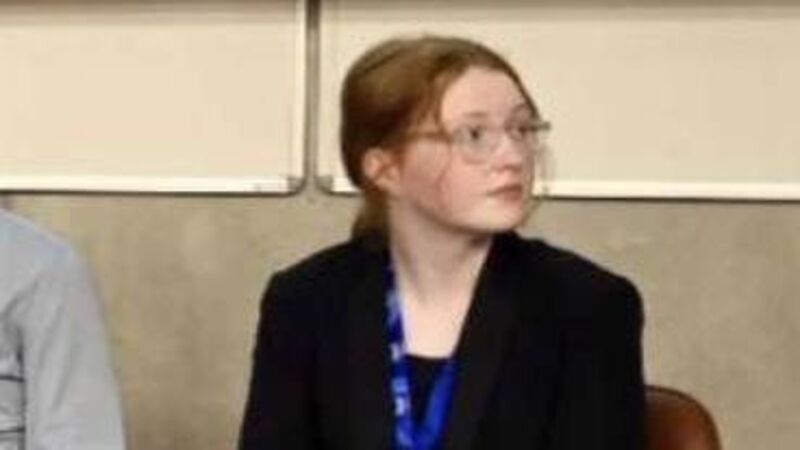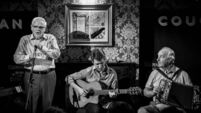Student to Student: 'Irish is our mother tongue and deserves a chance to be spoken'

Erin Ní Gallchobhair, who features in our Student to Student series.
INSPIRATION BEHIND THE SERIES
Young people deserve to hear from the perspectives, opinions, and experiences of other young people.
I believe we can learn from each other and help each other as we navigate the Irish education system.
I aim to draw from as many points of view as possible, making sure this advice is relevant to as many different students as possible.
The articles over the next 10 weeks will look at study skills, career route options, Leaving Certificate reflections, school experiences, and so on.
ABOUT ERIN
Erin Ní Gallchobhair is a 17-year- old from Cruit island on the coast of Donegal. In her spare time, she likes to swim. She is a part of the Donegal Youth Council, which she represents on Comhairle na nOg’s National Executive, “where we try to help make solutions for problems that young people face”.
In the fifth part of our ‘Student to Student’ series, I wanted to focus on Erin’s opinions on how Irish fits into school at the moment.
Erin firmly believes that “language is a history living, it’s anthropology with a pulse”.
Many students are tired of studying a language that they do not end up using much outside of school. As the goal of Irish class often feels orientated towards exams and not speaking the language, people can find it difficult to learn and enjoy.
Irish is also a compulsory subject for the Junior Cert and Leaving Cert, which means it isn’t a class students choose as one of their strengths. In fact, it may be bringing down a student’s grades and people can grow to resent the negative impact that Irish as a subject has on their CAO points.
I have heard these points from many young people, so hearing and understanding Erin’s beautiful relationship with the Irish language was really very interesting. She expressed her appreciation of and love for Irish, as well as its importance in her community.
Exploring these two very different opinions of Irish was a challenge, but I did observe some common ground. Many people see that the Irish language’s place in examinations needs to shift, or at least the focus of teaching Irish should be centred primarily on young people leaving school capable of speaking it.
Erin started our interview by talking about her home and how Irish plays a role in her life, saying; “I live in the outskirts of the Gaeltacht.”
That means that Erin uses Irish conversationally, and she passionately believes that actually using and speaking Irish is vital for it to flourish.
“For keeping the language alive, I think speaking it is important,” she said.
Erin feels she is surrounded by Gaeilge.
“I use it in work, I use it in my community and because of the Gaeltacht I hear it,” she said.
She explained why this is important: “There is a real sense of heritage and a real sense of community and culture.
I remember when I was younger, even in 1st and 2nd year, and I was in the same boat… of thinking ‘why are we learning this language that’s of no significance or advantage to us’. But it is!’
She recognised many people’s mixed feelings about Irish.
“A lot of it is less to do with functionality, but it’s your heritage, your mother tongue, it’s your country, and you know, it’s another way of communicating,” said Erin.
I sensed a real feeling of genuine excitement and enthusiasm about Gaelige from listening to her. Erin simply enjoys the Irish language.
“A lot of Irish words don’t have direct Irish translations. Even when I’m speaking, I wouldn’t be able to pick a word to do it justice in English and I think that’s amazing!”
She urges us all to remember the seanfhocal, or saying, ‘Is fearr Gaeilge briste na Bearla cliste’. That means, ‘Broken Irish is better than clever English.’
She emphasised: “Even if it’s only cupla focal (a couple of words), it doesn’t matter if you’re still making an effort.”
Erin encourages us all to speak what bit of Irish we can, whenever we can. She believes every little bit builds up and keeps it in use, fresh and alive.
At very least, you could say ‘Dia Duit’ instead of ‘Hello’ and ‘slán’ rather than ‘Goodbye’ next time you pass an acquaintance in town, get a coffee from a barista, or buy something in the shop.
She spoke to me about how she feels Irish is taught in schools and how it could be improved.
“As soon as you go into secondary you are learning grammar points, maybe past, present, future and then Irish prose and poetry. While there is strength in that because it is Irish literature and mechanics… it’s also a complete downfall because you’re not learning the language.”
She elaborated: “You have to have a focus on basic conversation for Irish, you have your oral and everything but it just fails a lot of students because we don’t have the time to learn the language. You only get the time to memorise sentences for essays.
"My school makes a really big effort, that really helps us because of encouragement and space to do it,” she added, giving a first hand example of how Irish could be better nurtured.
If I’m asking a teacher for something, I speak to them in Irish because they are speaking to me in it.
She feels this environment to practise is vital.
“Those small things help in leaps and bounds in my opinion,” she says.
Her final words to any students reading this were: “Another point is that just by being able to speak Irish in my community, it makes me happy. I go into Irish class to not learn the language, but I try to make the best of it
“Being fortunate to have the ability to speak Irish, however broken it is, I’m so grateful for, because it is our mother tongue and deserves a chance to be spoken.”







 App?
App?




